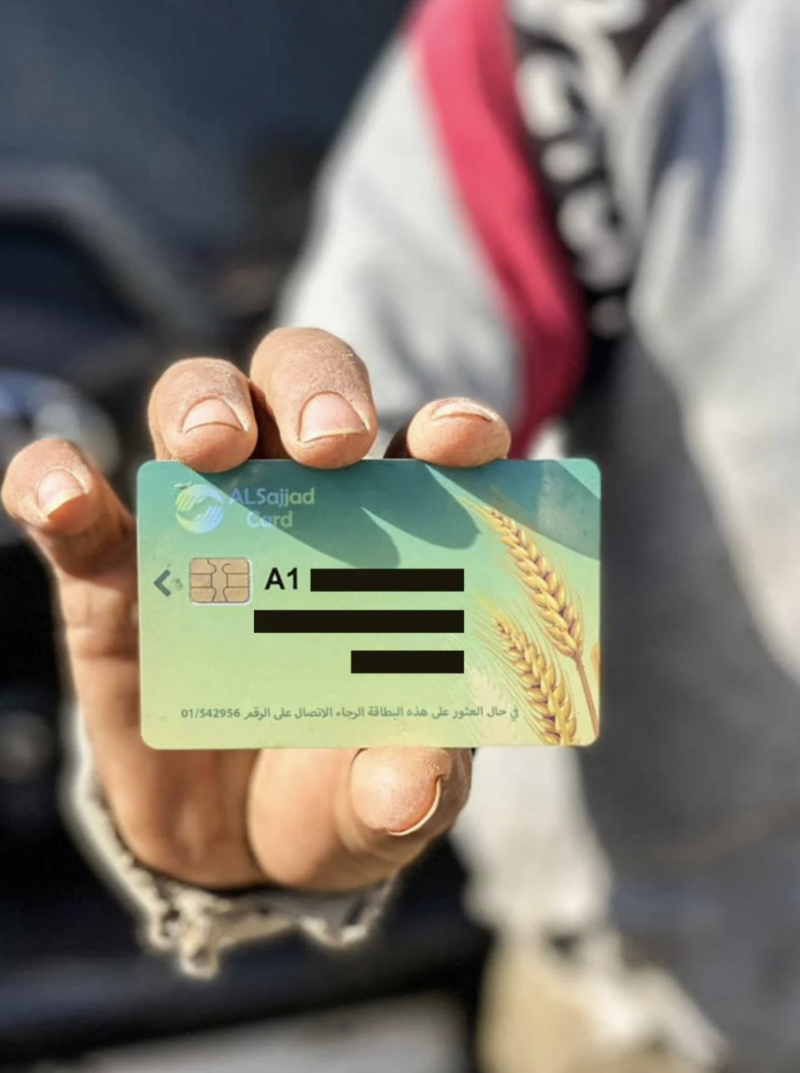
The al-Sajjad card. (Credit: Mohammad Yassine)
On Feb. 26 2024, an Israeli attack in Bekaa targeted warehouses used to pack goods for al-Sajjad, a Hezbollah supermarket chain. In light of this, we recommend (re-)reading this article published on Apr. 19, 2021.
Hezbollah has recently deployed a new weapon on Lebanese territory. It is neither a missile nor a drone, but a magnetic card that allows its holders access to the party's stores and substantial discounts on essential goods. In a country where more than half of the population now lives below the poverty line and where food prices have risen by 400% in a year, Hezbollah is trying to position itself as a substitute for the fundamentally clientelist state. Anticipating that subsidies are likely to be lifted soon, it is offering products at extremely low prices.
While roads throughout Beirut's southern suburbs and surrounding the city's airport are covered in posters advertising Iranian products, Hezbollah has begun distributing its "al-Sajjad" cards. These cards, named after the Shiite Imam Ali ibn al-Husayn, also known as "Zayn al-Abidin" or "al-Sajjad," who was renowned for aiding those in need, offer access to the party’s al-Nour cooperative stores. Entry to these shops, which resemble large depots, is otherwise forbidden. Hezbollah reportedly plans to open dozens of similar stores nationwide.
Holders of the al-Sajjad card benefit from discounts of up to 70% on food products in the cooperative, with a value of up to LL 300,000. Hezbollah refuses to disclose the number of cards already distributed, but according to corroborating information, it is around 8,000, with a further 12,000 in the pipeline. "There are a lot of people in these shops. People are mainly buying rice, sugar and oil," said Ali, a 35-year-old mechanic who has received his card. The products offered are of Lebanese, Syrian, Iraqi and Iranian origin.
A further step towards a mini-state
Recipients must have a salary of less than LL 1.5 million a month in a country where the national currency has lost more than 85% of its value since the start of the economic crisis. Eligibility is determined through an investigation by the party's social division, which includes a home visit.
"With this project, Hezbollah is taking another step towards a mini-state," said Mohammad Aouad, an activist opposed to Hezbollah. "We don't know where the products come from, how they got into Lebanon, whether they went through customs, whether they were approved by the Ministry of Commerce or whether they comply with the treaties signed by Lebanon," added Mr Aouad. Hezbollah has been accused of participating in the smuggling of subsidized products between Lebanon and Syria.
In Jun. 2020, the party's secretary general Hassan Nasrallah promised that his party would not let its supporters "starve to death." On Apr. 7, the party’s deputy Hassan Fadlallah claimed that Hezbollah "provides direct aid to 50,000 underprivileged families," adding that the number would rise to 100,000 during Ramadan. The party receives several hundred million dollars a year from Iran and continues to pay salaries to its closest supporters in dollars. Its microfinance institution, al-Qard al-Hassan, also enables members to bypass current banking system restrictions.
Hezbollah remains relatively discreet about this new initiative. "There is a clear intention not to discuss the project to avoid creating controversy around it, especially as, on the ground it has exceeded its initial objective," explained a source close to the party.
While the initial plan was to distribute the cards solely to its supporters in need, the party has finally extended the distribution to all those who want them. "You can't say no to someone who comes asking for help. As a result, many other regions are now benefiting. However, some political parties have expressly asked their supporters in areas under Hezbollah influence not to take advantage of this. This is one of the reasons for our discretion," the source added.
According to this source, the initiative is set to expand in a second phase, offering discounts on healthcare services and essential household appliances. Additionally, the program may be further extended to encompass all Lebanese regions wishing to benefit from this assistance.
Mazen Azzam from the western Bekaa interprets the al-Sajjad card as an electoral tool, conveying the message that "Hezbollah feeds you." He sees it as a sign that the “state is dying, while the Hezb mini-state is growing.”